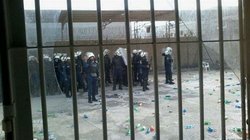 Human rights organizations have expressed solidarity with hundreds of political prisoners, who have launched a mass hunger strike in protest against mistreatment as well as poor conditions in Bahraini regime’s jails and detention facilities.
Human rights organizations have expressed solidarity with hundreds of political prisoners, who have launched a mass hunger strike in protest against mistreatment as well as poor conditions in Bahraini regime’s jails and detention facilities. RNA - On Monday, the European Center for Democracy and Human Rights (ECDHR) expressed solidarity with the hunger-striking inmates in a post published on its Twitter page, demanding the release of all imprisoned dissidents.
The Americans for Democracy and Human Rights in Bahrain (ADHRB) also expressed solidarity with the prisoners.
Earlier in the day, Amnesty International said more than 450 inmates from Jau Prison and Dry Dock Detention Center had gone on a mass hunger strike to express their grave resentment over dire prison conditions, including ill-treatment, the glass barrier separating them from their families during visits, arbitrary searches and confiscation of their belongings.
The action came after fifteen political prisoners started on August 15 an open hunger strike following two full years of systematic isolation in Jau Prison.
The dissidents are imprisoned along with other inmates, who don't share their language, religion, traditions or culture. They are also charged with different crimes.
Thousands of anti-regime protesters have held demonstrations in Bahrain on an almost daily basis ever since a popular uprising began in the country in mid-February 2011.
They are demanding that the Al Khalifah regime relinquish power and allow a just system representing all Bahrainis to be established. Manama has gone to great lengths to clamp down on any sign of dissent. On March 14, 2011, troops from Saudi Arabia and the United Arab Emirates were deployed to assist Bahrain in its crackdown.
On March 5, 2017, Bahrain’s parliament approved the trial of civilians at military tribunals in a measure blasted by human rights campaigners as being tantamount to imposition of an undeclared martial law countrywide.
Bahraini monarch King Hamad bin Isa Al Khalifah ratified the constitutional amendment on April 3, 2017.
847/940